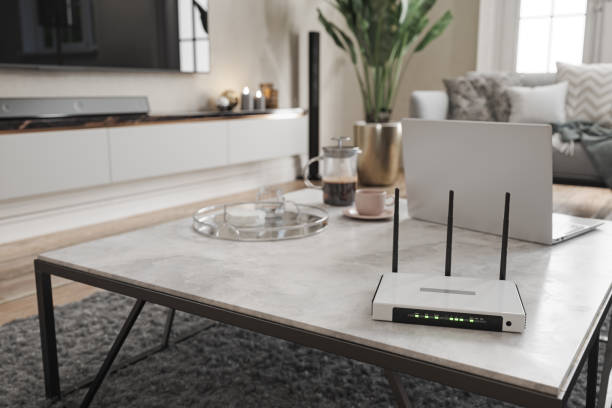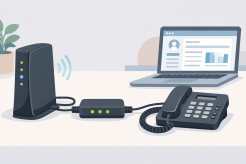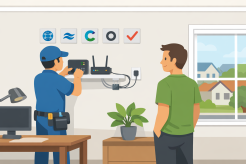Fiber vs. DSL vs. Cable: Which Internet Type is Best for Your Business?

Choosing the right internet connection is crucial for any business, regardless of size or industry. A reliable internet connection can impact everything from communication to productivity and overall efficiency. With so many options available, it's essential to understand the pros and cons of each. In this article, we’ll compare Fiber, DSL, and Cable to help you determine which internet type is the best for your business needs.
Understanding the Basics of Fiber, DSL, and Cable Internet
Before we dive into which type of internet is best for your business, let’s break down how each one works.
Fiber Internet
Fiber internet uses fiber-optic cables to transmit data as light signals, which allows for faster data transfer speeds compared to other types of internet connections. Fiber internet for businesses is known for its high reliability, low latency, and symmetric download and upload speeds, making it ideal for data-heavy tasks.
DSL (Digital Subscriber Line)
DSL uses traditional copper telephone lines to transmit data. While not as fast as fiber, DSL is a cost-effective and widely available option. It can be a good choice for smaller businesses or those located in rural areas, but it might not provide the bandwidth necessary for larger operations.
Cable Internet
Cable internet uses coaxial cables, typically the same ones used for cable TV. It offers speeds that can rival DSL and, in some cases, even fiber, but its performance can be affected by the number of users in your area. This means that during peak times, you might experience slower speeds.
Speed: Which Connection Is the Fastest?
One of the most important considerations for businesses is speed. Let’s break down how each option performs in terms of speed.
1. Fiber Internet: The Speed King
Fiber internet is by far the fastest option, offering speeds up to 1 Gbps (and in some cases, even higher). With fiber, businesses can enjoy lightning-fast downloads and uploads, making it perfect for companies that require heavy data usage, like cloud storage or video conferencing. A guide to high-speed internet for business can help you understand just how important speed is in today’s digital world.
2. DSL: Reliable but Slower
DSL typically offers speeds between 5 and 35 Mbps, depending on your location and provider. While this may be sufficient for small businesses, it can be a bottleneck for those that require faster speeds for file sharing, video streaming, or VoIP services.
3. Cable Internet: A Middle Ground
Cable internet speeds generally range from 25 Mbps to 500 Mbps, depending on the provider and plan. While faster than DSL, cable internet speeds can fluctuate based on network congestion in your area.
Reliability: Keeping Your Business Online
A reliable internet connection is essential for business operations. Let’s see how Fiber, DSL, and Cable fare in terms of reliability.
1. Fiber Internet: Maximum Reliability
Fiber internet offers the best reliability, with less interference from external factors like weather or network congestion. Fiber networks are more resilient, making them ideal for businesses that need uninterrupted service.
2. DSL: Good in Rural Areas
DSL is generally reliable, especially in areas with fewer internet users. Since it operates on dedicated phone lines, it doesn’t suffer from the same congestion issues as cable. However, its performance may be limited in terms of speed and distance from the provider’s hub.
3. Cable Internet: Variable Performance
While cable internet is typically reliable, its performance can dip during peak hours when more people are using the network. This is something to consider if your business operates during those high-traffic times.
Cost: Balancing Budget with Performance
For many businesses, the cost of an internet connection can be a major factor. Here’s how Fiber, DSL, and Cable stack up in terms of affordability.
1. Fiber Internet: Premium Pricing
Fiber internet generally comes at a higher cost than DSL or cable. However, the faster speeds and greater reliability often justify the additional expense for businesses that rely heavily on internet connectivity. Choosing the best type of internet for your business will depend on how much you’re willing to invest in speed and performance.
2. DSL: Budget-Friendly Option
DSL is the most affordable option, making it a good choice for small businesses or those with limited internet needs. However, the lower cost also means slower speeds, which may not be ideal for all businesses.
3. Cable Internet: A Reasonable Middle Ground
Cable internet tends to be priced between DSL and Fiber, making it a middle-ground option. It offers better speeds than DSL but at a lower price point than fiber, making it a good balance for businesses that need moderate performance without breaking the bank.
Which Internet Type Is Best for Different Business Sizes?
Small Businesses
For small businesses, DSL or cable may be sufficient, especially if the business primarily uses the internet for basic tasks like email, web browsing, or light data transfers. However, if your business grows or begins to rely more on cloud services or video conferencing, upgrading to fiber may be necessary.
Medium-Sized Businesses
Medium-sized businesses will benefit from cable internet, as it offers higher speeds than DSL at a reasonable cost. If your business handles moderate amounts of data, video streaming, or online collaboration, cable is a great option.
Large Enterprises
For large enterprises, fiber is undoubtedly the best choice. The speed, reliability, and bandwidth offered by fiber are essential for businesses that need uninterrupted access to the internet, whether for cloud computing, VoIP systems, or data backups. Best internet service providers often offer fiber plans that cater to enterprise-level needs.
Setting Up Your Business Internet Connection
Once you've chosen the right internet type, setting up your Wi-Fi network is the next step. A solid network setup ensures that your employees can easily connect to the internet and maintain productivity. Here’s a helpful guide on how to set up a Wi-Fi network for your business.
Conclusion: Which Internet Type Should You Choose?
When deciding between Fiber, DSL, and Cable for your business, consider factors like speed, reliability, and cost. Fiber internet is the best choice for large businesses that need fast, reliable internet for heavy data usage. Cable internet offers a good balance of speed and affordability, making it ideal for medium-sized businesses. DSL internet is the most budget-friendly option and works well for small businesses with limited internet demands.
By understanding your business’s needs and budget, you can make an informed decision about which internet type will best support your operations. For further information, explore different internet options for business and make sure you’re investing in the best technology for your company’s success.
Related Posts

Mon, Jan 26, 2026 9:00 PM
cheap internet dealsNegotiate a Better Deal on Your Internet Service Without the Hassle
Learn simple ways to negotiate a better internet deal, reduce your monthly bill, and get the speed you actually need without switching providers.

Fri, Jan 23, 2026 4:45 AM
Internet BundlesDIRECTV Deals and Promotions to Know in 2026
Explore updated DIRECTV deals and packages for 2026. Compare channels, pricing, and promotions to find the right live TV plan for your home.

Thu, Jan 22, 2026 1:24 AM
RegulationsConnect Your Home Phone to Viasat Voice
Learn how to connect your home phone to Viasat Voice with this step-by-step guide. Ensure reliable calls, optimal performance, and troubleshoot common issues.

Wed, Jan 21, 2026 2:42 AM
Internet Bundles cheap internet offersGet Reliable Rural Satellite Internet with Viasat
Get reliable rural satellite internet with Viasat. Explore current plans, speeds, pricing, and tips to choose the best option for your home.

Wed, Jan 21, 2026 12:44 AM
Technology Broadband InstallationInternet Provider Installation FAQs: What to Expect and How to Prepare
Learn what to expect from internet provider installations, including AT&T, Spectrum, Cox, Optimum, and Verizon Fios. Self-install vs professional setup explained.